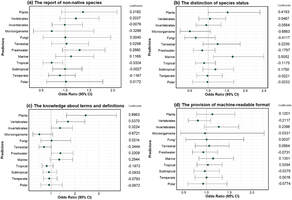|
|
We are a group of researchers working on assessing the spatial responses of species and ecosystems to global change, with a focus on biological invasions, climate change and land use change. Read more about our research topics on the research page and check our publications and news below to follow our activities.
Keywords: Biological invasions; Conservation biogeography; Ecological modelling; Global change biogeography; Machine learning; Predictive modelling; Species distributions; Wetlands & wetland conservation. |
|
NEWS 2024

12 Jul, 2024: We recently published a work that provides a conceptual and methodological framework for using citizen science data to predict the timing of occurrence of seasonal ecological phenomena driven by external environmental factors. The potential applicability of this approach is wide, and in the work is demonstrated by predicting the timing of occurrence of adult non-native Japanese beetles (Popillia japonica) and the edible mushroom, winter chanterelle (Craterellus tubaeformis), in Europe.
This approach also underlies the near real-time forecasts we run and provide on the NatureForecast.org platform. A research highlight can be found here and the paper here.

10 Jul, 2024: Iúri Diogo has published the results of his master's thesis, predicting the risk of invasion by broadleaf watermilfoil (Myriophyllum heterophyllum) in mainland Portugal. The work crosses information about areas with higher potential for introduction owing to aquarium-related activities and the suitability of environmental conditions to identify areas where the species could already be occurring or come to occur. Most high-risk areas are found close to larger human population concentrations in the central and northern coastal areas of mainland Portugal. A research highlight can be found here and the paper here.

7 May, 2024: On 7 May, the Biochange team hosted a presentation session as an initiative of the Invasive Species Week 2024. The invited speakers, André Duarte (RAIZ) and Inês Mendes (SatCen), and the Biochange team addressed several themes including the potential for using UAVs to map invasive species, the biogeography of biological invasions, and ecosystem mapping. César Capinha launched the Natureforecast.org, a platform to support environmental risk monitoring and assessment. Check more information here. See you on the next Biochange Day!

2 May, 2024: César Capinha has been included in the list of the best researchers in Ecology and Evolution in Portugal. The 3rd edition of Research.com ranking of the best scientists in the discipline of Ecology and Evolution is based on data consolidated from various data sources including OpenAlex and CrossRef. Congratulations! 👏
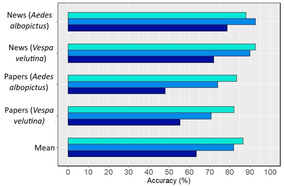
10 Feb, 2024: In a new preprint, we provide results aimed at the automatization of a set of procedures that have been haunting many of us for a long time: interpreting, extracting, and geocoding biogeographical data from free-flowing and related unstructured text data (as found in research papers, reports, webpages, etc.). We tested the capacity of three current state-of-the-art large language models (GPT-3.5, GPT-4, and Llama-2-70B) and found a remarkable ability for the direct automatization of these procedures, simply by requesting (via chat) the models to perform the requested tasks. Some tasks work better for some models and for specific types of text, but a promising avenue of automatization for biogeographical data extraction is on the rise. You can read the biorXiv preprint here.
NEWS 2023
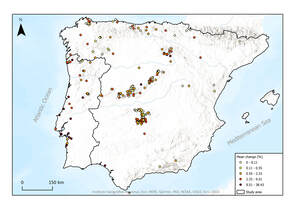
18 Dec, 2023: In a new article published in Ecological Indicators, we present the most detailed and extensive distribution data for Iberian peatlands to date and analyse the dynamics and drivers of land use change in Iberian peatlands and their surrounding areas. The analysis of 270 peatland locations on the Iberian Peninsula revealed that agricultural areas and artificial surfaces have expanded the most. Lowland peatlands (littoral and sublittoral) have experienced more intense land use changes (9.51 % to 38.43 % of the total area), presenting special conservation needs. A research highlight can be found here and the paper here.
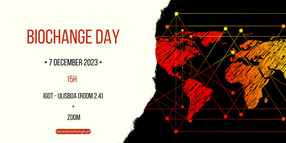
7 Dec, 2023: On December 7th, our team hosted the II BIOCHANGE DAY, an afternoon dedicated to presentations on current research topics and future projects. Currently, our team is working on themes related to the biogeography of invasive species, database creation, peatlands, remote sensing, among other topics. Additionally, we had the presence of researcher Joana Ribeiro from CIBIO, who shared insights into her research on invasive species.
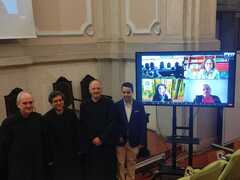
24 Oct, 2023: Miguel Monteiro successfully defended his doctoral thesis, Human-mediated introductions of macrofungi worldwide: Distribution patterns and impacts, and was distinguished with the highest grade! Congrats Miguel!
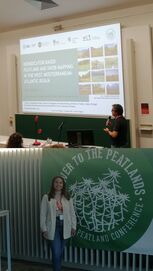
25 Sep, 2023: Miguel Geraldes and Raquel Fernandes participated in the European Peatland Conference Power to the Peatlands! (19 - 21 September, 2023, Antwerp, Belgium), with two communications about their recent research into Iberian peatlands: "Bioindicator-based peatland and swob mapping in the West Mediterranean-Atlantic realm" (MG), and "Land use and land cover pressures on Iberian peatlands" (RF). The conference had more than 500 peat experts and aimed to place peatlands back at the core of European nature and climate policy.
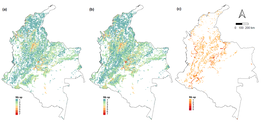
20 Sep, 2023: In a new paper published in Animal Conservation, we evaluated the impact of road network expansion on primate species in Colombia over time. We show that between 1970 and 2015, there were nearly 40 000 km2 where at least one species was at risk of local extinction due to road expansion. This study contributes to understanding road impacts on local biodiversity in a tropical biodiversity hotspot and highlights the need of infrastructure accounting for the necessary mitigation and conservation actions. The work is a collaboration with the Alexander von Humboldt Biological Resources Research Institute of Colombia and Bangor University in Wales, UK. A research highlight can be found here and the paper here.
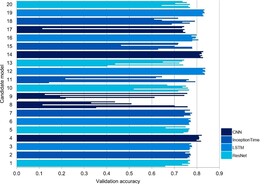
28 Aug, 2023: In a new publication in Ecological Informatics, we present a framework we developed to forecast the abundance of disease vectors with deep learning. We applied this approach to the dengue mosquito Aedes aegypti on Madeira island and show that it performs better than classical machine learning methods. Linking our approach to disease transmission or vector importation models will contribute to operational, early warning systems of arboviral disease risk. A research highlight can be found here and the paper here (open access).
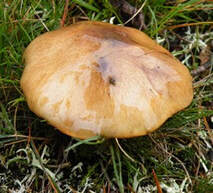
13 Jun, 2023: In a new paper published in Neobiota, we provide a first step towards an integrated analysis of the positive and negative impacts of alien macrofungi with the aim of increasing the current knowledge regarding the effects caused by these taxa in non-native regions. To do that, we compiled a database of the recorded socio-economic and environmental impacts of alien macrofungi from all relevant sources we could identify. See short description in the Research Highlights section or the full paper from ResearchGate or Neobiota.
|
29 May, 2023: In a new publication in Ecology and Evolution, we looked at how authors of species checklists are reporting species occurrences, particularly concerning non-native taxa. We found marked variation in data reporting structures, storage formats, and the omission or inconsistency of relevant information and terminology use. These results highlight ongoing challenges to identify, collect, and integrate species distribution reports into analytical workflows. A research highlight can be found here and the paper here (open access).
|
|
|
20 May, 2023: On May 19, the I BIOBLITZ BIOCHANGE took place in Cidade Universitária (Lisbon). This event was a contribution of our team for the "Invasive Species Week 2023" and for the "III Bioblitz Flora of Portugal", and counted with the partnership of Prof. Sérgio Chozas.
During the bioblitz, the participants registered in iNaturalist several invasive species (and also some native species) that are present around the faculties of the University of Lisbon. Moreover, we have displayed a poster about invasive species at the entrance of IGOT-UL (see here, in Portuguese). Thanks to all participants! |
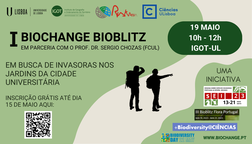
28 Apr, 2023: On 19 May, our team presents the 1st edition of the "Biochange BioBlitz", in collaboration with Prof. Dr. Sergio Chozas, from FCUL, one of the people responsible for the "+Biodiversity@Ciências" project".
We will explore some gardens of the Cidade Universitária to recognize invasive species (plants and animals), register them on iNaturalist, and learn more about their influence on the ecosystem.
This initiative is included in the Invasive Species Week 2023 and the III Bioblitz Flora of Portugal. Let's learn about invasive species! Registration link here, until 15 May.
We will explore some gardens of the Cidade Universitária to recognize invasive species (plants and animals), register them on iNaturalist, and learn more about their influence on the ecosystem.
This initiative is included in the Invasive Species Week 2023 and the III Bioblitz Flora of Portugal. Let's learn about invasive species! Registration link here, until 15 May.
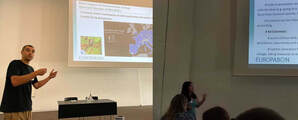
16-20 Apr, 2023: César Capinha and Ana Ceia-Hasse participated in the EuropaBON workshop on showcases and co-design, which gathered experts from across the world to contribute to designing an European Biodiversity Observation Network. They presented the work they are developing in this project, on “Biodiversity monitoring and forecasting in support of the EU Bioeconomy Strategy” and reported on the progresses made during the workshop.
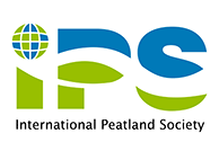
3 Apr, 2023: In March 2023, Raquel Fernandes was one of the winners of the 2023 Allan Robertson Grants for Research Students and Young Professionals, with the project "Remote sensing of invasive alien plants in Portuguese sublittoral peatlands" . This Grant is launched by the International Peatland Society and are awarded to young peatland and peat researchers. A project report will be published in an IPS magazine Peatlands International and Raquel will give a presentation of it at the 2024 international IPS event.

1 Apr, 2023: In April 2023, Henrique Couto will start his PhD program in Conservation Biology in our research team at IGOT and at the Centre for Ecology, Evolution and Environmental Changes (cE3c).
His work will aim to identify, quantify and evaluate the impacts of invasive lepidopterans worldwide, using advanced big data and machine learning approaches.
Welcome Henrique!
His work will aim to identify, quantify and evaluate the impacts of invasive lepidopterans worldwide, using advanced big data and machine learning approaches.
Welcome Henrique!
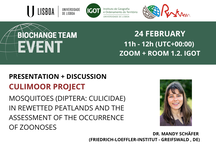
16 Feb, 2023: On the 24 February, researcher Dr. Mandy Schäfer (Friedrich-Löffler-Institut, DE) will make an online presentation of the project "CuliMoor - Mosquitoes (Diptera: Culicidae) in rewetted peatlands and the assessment of the occurrence of zoonoses".
The project aims to understand the composition of mosquito communities in rewetted peatlands and the risk associated with these species as disease vectors. The presentation will be open for all interested, by ZOOM (request the link) and presential (IGOT-UL).
The project aims to understand the composition of mosquito communities in rewetted peatlands and the risk associated with these species as disease vectors. The presentation will be open for all interested, by ZOOM (request the link) and presential (IGOT-UL).

2 Feb, 2023: César Capinha has been nominated full member of the Sigma Xi Scientific Research Honor Society (publishers of the American Scientist Magazine, among other things). Full membership in this society distinguishes "individuals who have demonstrated noteworthy achievement as an original investigator in a field of the pure or applied sciences".
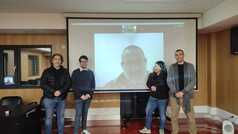
26 Jan, 2023: Iúri Diogo successfully defended his master thesis Spatial Analysis of Susceptibility to Invasion by Myriophyllum heterophyllum in Mainland Portugal. A fantastic work! Congrats Iúri!
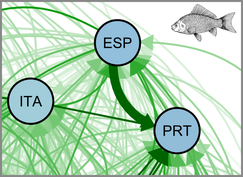
2 Jan, 2023: In a new publication in PNAS, we uncover the global networks of spread of alien species across countries, which are characterised by the early presence of alien species in some countries playing central roles in the global trade network, followed by radiative spread in geographically close countries with similar climates. Research highlight can be found here and the paper here (open access after first six months).
NEWS 2022

12 Dec, 2022: The 1st "Biochange day" will on the 16th of December, presential (IGOT-UL) and online (by request). It will be an opportunity to share and discuss our team investigation. Also, we will have presentations from two invited speakers. Program and further informations here.
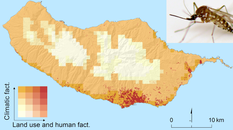
17 Sep, 2022: In a new publication, we provide the first assessment of the current and future potential distribution of the invasive disease vector mosquito Aedes aegypti on Madeira Island, where it was responsible for a dengue outbreak in 2012. Open access here.
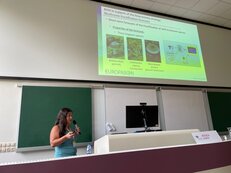
24 Aug, 2022: Ana Ceia-Hasse participated in the 6th European Congress of Conservation Biology (ECCB 2022) in Prague. She presented part of our ongoing work within project EuropaBON in the symposium ‘The future of biodiversity monitoring in Europe’ on forecasting the frutification of mushroom species of commercial and recreational interest, with a presentation titled ‘Biodiversity monitoring and forecasting to support the Bioeconomy Strategy and EU citizens at large’.
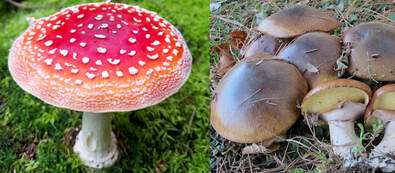
August, 2022: In a recent paper, we provide the first comprehensive examination of the distribution patterns of non-native macrofungi worldwide. See short description in the Research Highlights section or the full paper from ResearchGate or and DDi.
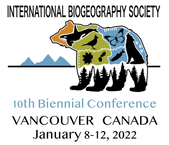
1, June, 2022: Over the coming days Ana Ceia-Hasse will participate in the 10th International Biogeography Society Biennial Conference in Vancouver. She will present some of our ongoing work on machine learning and artificial intelligence, entitled ‘Deep learning in ecology and biogeography: making the most of temporal data, which will take place on June 3 at 3 p.m. PDT.
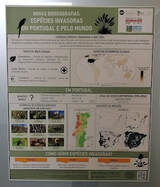
23, May, 2022: To celebrate the Invasive Species Week (SEI 2022) and the International Day for Biological Diversity (22nd May), we have made a poster about invasive species and their impacts in Portugal and in the world (see here; in portuguese), that is on display at the entrance of IGOT-UL. We are also promoting a webinar about invasive species on riparian systems. Sign up here.
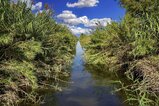
12, Apr, 2022: In a recent publication, we provide the first assessment and predictions of invasive alien plant richness across riparian ecosystems of Portugal. Check it here.
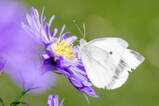
25, Feb, 2022: We are looking for candidates interested in pursuing a PhD on the global biogeography of invasive Lepidoptera. See here for more information. 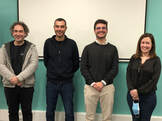
23, Feb, 2022: Gonçalo Varela successfully defended his Master thesis on the distribution of the invasive Asian hornet (Vespa velutina nigrithorax) in cities of Portugal. Hooray for Gonçalo! 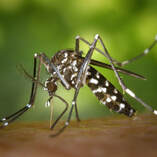
24, Jan, 2022: We have collaborated on an online piece about the alien invasive mosquito Aedes albopictus in mainland Portugal. Have a look at it here [in portuguese]. |
